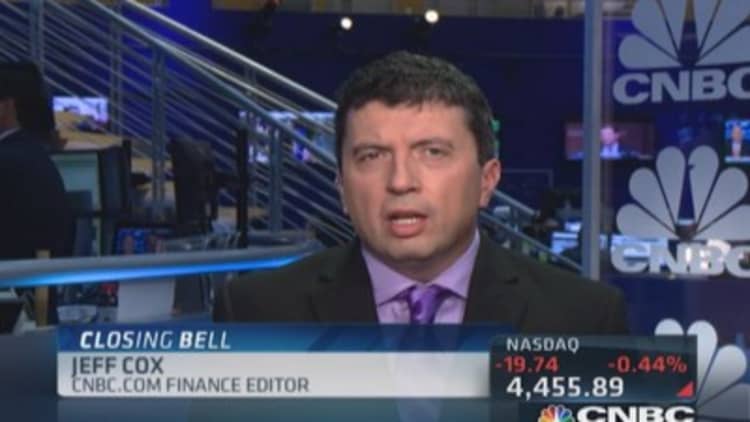
Companies that have used cheap money to load up on debt and boost earnings have been the market darlings for the past two years, but it's a trade that is getting old.
With tightening conditions—particularly a rising dollar and upward pressure on interest rates—companies with weak, high-debt balance sheets would be the big losers as that trend plays itself out.
In the past two years, firms that levered up outperformed their less debt-laden peers by 48 percentage points, but Goldman Sachs analysts believe the party is nearing its conclusion.
"Tightening financial conditions particularly affect firms with weak and highly levered balance sheets given these firms have less capacity to withstand rising capital costs," Goldman's chief strategist, David J. Kostin, and others said in a note to clients.
A proprietary measure Goldman uses to monitor those dynamics—its Financial Conditions Index—shows that things are changing.
Read MoreAs market wobbles, mom-and-pop crowd gets nervous
"Financial conditions usually tighten for one of two opposing reasons: (1) financial market frictions make credit more costly, or (2) improving economic growth drives interest rates higher," Kostin wrote. "Our macro forecasts suggest financial conditions will tighten during the coming year as the Fed hikes rates and the dollar strengthens."
To be sure, those conditions won't change overnight, and Goldman said it is not yet advising clients to dump companies that are highly leveraged—its "bad balance sheet" companies. Those firms have outperformed "strong balance sheet" companies, rising 93 percent against a 45 percent gain for companies that have low or no debt overhang. That compares with a 52 percent gain for the during the period.
But the note serves as an early heads-up that as the Federal Reserve moves away from its historically accommodative monetary policies, the landscape is going to change for companies and investors. Firms that used cheap money to buy back shares and boost profits will have a harder time as interest rates begin to rise and the U.S. tries to get out of the global currency race to the bottom.
Read MoreKing dollar rules: Betting on the buck
The trend of weak-over-strong has reversed over the past three months or so, with strong outperforming weak by 3.8 percentage points since mid-July, a period that has coincided with tightening financial conditions as measured by Goldman's FCI.
As a trade for now, Goldman said it has "closed" its recommendation of weak over strong balance sheets and now believes "risks are broadly balanced between" the two types.
Goldman considers these companies to be the top choices among businesses with the best and weakest balance sheets, respectively:






